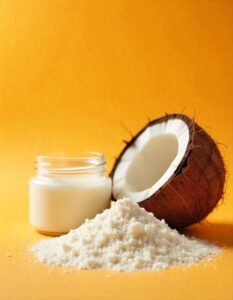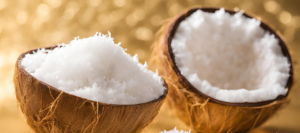The global market for coconut and coconut products is experiencing a phenomenal surge, driven by changing consumer preferences, increased awareness about health and wellness, and growing demand for sustainable and plant-based alternatives. Coconuts, with their unique flavors, versatility, and numerous applications, have become an essential ingredient in various industries worldwide. In this extensive blog, we dive into the exciting realm of the global coconut market, exploring the latest trends, emerging opportunities, sustainable practices, and the diverse range of coconut-based products. Join us on this journey as we unveil the vast potential and sustainable growth of the global coconut industry.
- Rising Demand for Healthy and Natural Products:
The global market for coconut and coconut products is propelled by the escalating demand for healthy and natural alternatives. Consumers are increasingly gravitating towards products that promote wellness, nutrition, and sustainability. Coconuts perfectly align with these preferences as they offer a wealth of health benefits, including hydration, healthy fats, vitamins, and minerals. The natural sweetness and distinct flavors of coconut products further contribute to their popularity.
- Exploring Coconut-Based Food and Beverages:
Coconuts are widely used in the food and beverage industry, showcasing their versatility and culinary potential. Coconut water, with its refreshing properties and electrolytes, has become a popular choice for hydration. Coconut milk and cream are extensively used in various cuisines, adding richness to curries, desserts, and beverages. Moreover, coconut flour and coconut oil have emerged as valuable ingredients in gluten-free baking and cooking, providing healthier alternatives without compromising taste.
- Coconut in Cosmetics and Personal Care:
Coconut-based products have gained significant traction in the cosmetics and personal care industry. The nourishing properties of coconut oil make it a prized ingredient in skincare, hair care, and body care products. Coconut oil moisturizes and rejuvenates the skin, promotes healthy hair growth, and offers natural protection. Coconut-derived ingredients, such as coconut milk and coconut water, are also used in natural and organic cosmetics, adding hydration and rejuvenation to beauty routines.
- Sustainable Practices in Coconut Farming and Production:
The global coconut industry is increasingly adopting sustainable practices to ensure the long-term viability of coconut farming and production. This includes organic farming methods, fair trade initiatives, and responsible sourcing. Sustainable coconut farming promotes biodiversity, protects ecosystems, and supports the well-being of local communities. Companies are working closely with farmers to implement ethical practices, reduce environmental impact, and ensure fair wages and working conditions.
- Market Trends and Opportunities:
The global coconut market is marked by several trends and opportunities that contribute to its continuous growth. Emerging markets, such as Asia-Pacific and Latin America, are witnessing a surge in demand for coconut products, driven by factors like changing lifestyles, urbanization, and increased disposable income. Convenience and functional products, such as ready-to-drink coconut beverages and coconut-based snacks, are gaining popularity among busy consumers seeking nutritious and on-the-go options.
- The Plant-Based and Vegan Boom:
Coconut products are at the forefront of the plant-based and vegan revolution. As more individuals embrace a plant-based lifestyle, coconut-based alternatives offer a versatile and sustainable choice. Coconut milk and cream serve as excellent substitutes for dairy products, catering to lactose-intolerant individuals and vegans. Coconut oil is used as a plant-based alternative to butter and other cooking oils, while coconut flour provides gluten-free options in baking.
- Sustainability and Environmental Impact:
The sustainable nature of coconut farming and production contributes to the industry’s positive environmental impact. Coconuts grow in diverse ecosystems, often coexisting with other crops and preserving biodiversity. Additionally, coconut trees require minimal irrigation and fertilizers, making them well-suited for sustainable agriculture. By supporting sustainable coconut practices, consumers contribute to a more environmentally friendly and socially responsible global market.
- Health and Wellness Benefits:
Consuming coconut and coconut-based products offer numerous health benefits. Coconut water hydrates the body, replenishing electrolytes naturally. Coconut oil, with its medium-chain fatty acids, supports heart health, boosts metabolism, and aids in weight management. Coconut milk and cream provide an excellent source of healthy fats, vitamins, and minerals. Incorporating coconut products into a balanced diet can contribute to overall well-being.
- Innovation and Product Development:
The global coconut market continues to evolve with innovative product development and diversification. Companies are exploring new ways to incorporate coconut into different product categories, such as energy bars, protein powders, ice creams, and even coconut-based non-dairy cheeses. The versatility and consumer appeal of coconuts inspires ongoing innovation and the introduction of exciting products in the market.
Conclusion:
The global market for coconut and coconut products is a thriving and dynamic industry. From food and beverages to cosmetics, personal care, and more, coconuts have captured the attention of consumers seeking healthy, natural, and sustainable alternatives. As demand continues to rise, the industry is embracing sustainable farming practices, exploring innovative product development, and expanding into emerging markets. By being mindful of sustainability, supporting fair trade, and enjoying the vast array of coconut-based products, consumers play an active role in the growth and sustainability of the global coconut market. Embrace the wonders of coconuts, relish their delicious flavors, and contribute to a healthier and more sustainable future.



